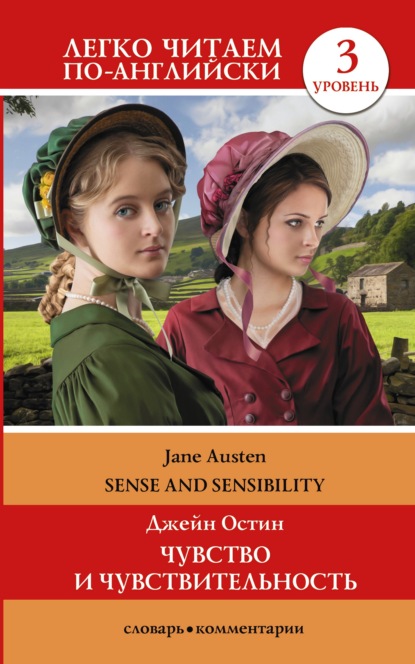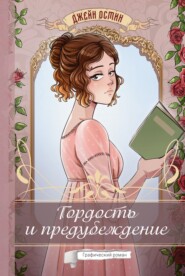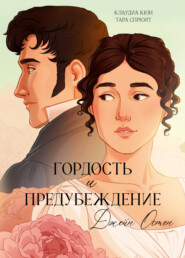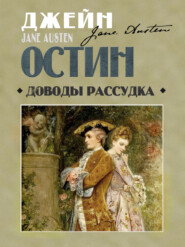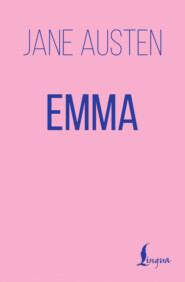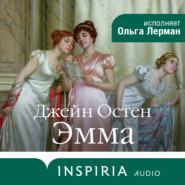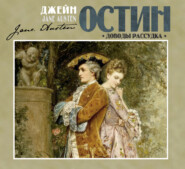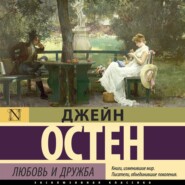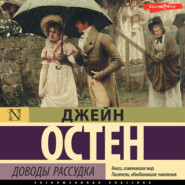По всем вопросам обращайтесь на: info@litportal.ru
(©) 2003-2025.
✖
Sense and Sensibility / Чувство и чувствительность. Уровень 3
Настройки чтения
Размер шрифта
Высота строк
Поля
Elinor saw, with great uneasiness the low spirits of her friend. It was evident that he was unhappy.
He joined her and Marianne in the breakfast-room the next morning before the others were down. Marianne soon left them to themselves. But after few steps she heard the parlour door open, and, turning round, was astonished to see Edward himself come out.
“I am going into the village to see my horses,” said he, “as you are not yet ready for breakfast; I shall be back again presently.”
Edward returned to them with fresh admiration of the surrounding country; in his walk to the village, he had seen many parts of the valley. Marianne began to describe her own admiration of these parts, and to question him, when Edward interrupted her,
“You must not enquire, Marianne. I shall offend you by my ignorance. I shall call hills steep, not bold; surfaces strange and uncouth, not irregular and rugged. I know nothing of the picturesque.”
“I am afraid it is true,” said Marianne; “but why do you boast of it?”
“I suspect,” said Elinor, “that to avoid one kind of affectation, Edward here falls into another.”
“I am convinced,” said Edward, “that you really feel all the delight. But your sister must allow me to feel no more than I profess. I do not like crooked, twisted, blasted trees. I admire them much more if they are tall, straight, and flourishing. I do not like ruined, tattered cottages. I am not fond of nettles or thistles, or heath blossoms. I have more pleasure in a snug farm-house than a watch-tower. Happy villagers please me better than the finest banditti in the world.”
Marianne looked with amazement at Edward, with compassion at her sister. Elinor only laughed.
Marianne remained thoughtfully silent, till a new object suddenly engaged her attention. She was sitting by Edward, and his hand passed so directly before her. She saw a ring, with a plait of hair in the centre.
“I never saw you wear a ring before, Edward,” she cried. “Is that Fanny’s hair? But I think her hair is darker.”
Edward coloured very deeply, and giving a momentary glance at Elinor, replied,
“Yes; it is my sister’s hair.”
Elinor met his eye, and thought that the hair was her own. But where and how did he get it?
Edward’s embarrassment lasted some time. He was particularly grave the whole morning.
Before the middle of the day, Sir John and Mrs. Jennings visited them. With the assistance of his mother-in-law, Sir John was not long in discovering that the name of Ferrars began with an F, preparing ground for future jokes.
Sir John never came to the Dashwoods without either inviting them to dine at the park the next day, or to drink tea with them that evening.
“You must drink tea with us tonight,” said he, “we shall be quite alone – and tomorrow you must absolutely dine with us, we shall be a large party.”
“And after that – a dance,” said Mrs. Jennings. “And that will tempt you, Miss Marianne.”
“A dance!” cried Marianne. “Impossible! Who will dance?”
“Who! Yourselves, and the Careys, and Whitakers.”
Chapter XIX
Edward remained a week at the cottage. His spirits, during the last two or three days, were greatly improved. He valued their kindness beyond anything, and his greatest happiness was there. He had no pleasure at Norland; he detested towns; but either to Norland or London, he must go. Yet, he must leave them at the end of a week, in spite of their wishes and his own. Elinor was disappointed, however, and vexed, and sometimes displeased with his uncertain behaviour to herself.
“I think, Edward,” said Mrs. Dashwood, as they were at breakfast the last morning, “you will be a happier man if you have any profession to engage your time and give an interest to your plans and actions.”
“I assure you,” he replied, “that I have long thought on this point, as you think now. It has been, and is, and probably will always be a heavy misfortune to me, that I have had no necessary business to engage me, no profession to give me employment. We never agreed in our choice of a profession. I always preferred the church, as I still do. But that was not smart enough for my family. They recommended the army. I have been idle since my Oxford studies.”
Elinor sat down to her drawing-table as soon as he was out of the house, busily employed herself the whole day. Elinor found time every day to think of Edward, and of Edward’s behaviour, – with tenderness, pity, approbation, censure, and doubt.
One morning, soon after Edward’s leaving, she was quite alone. She drew her eyes to the window, and she saw a large party walking up to the door. Amongst them were Sir John and Lady Middleton and Mrs. Jennings, but there were two others, a gentleman and lady, who were quite unknown to her. She was sitting near the window, and as soon as Sir John perceived her, he stepped across the turf, and spoke to her.
“Well,” said he, “we have brought you some strangers. How do you like them?”
“Hush! they will hear you.”
“Never mind if they do. It is only the Palmers. Charlotte is very pretty, I can tell you. You may see her. Where is Marianne? Has she run away? I see her instrument is open.”
“She is walking, I believe.”
Mrs. Jennings impatiently joined them, coming to the window,
“How do you do, my dear? How does Mrs. Dashwood do? And where are your sisters? What! All alone! You will be glad of a little company to sit with you. I have brought my other son and daughter to see you.”
Elinor stood up. Lady Middleton introduced the two strangers. Mrs. Dashwood and Margaret came downstairs at the same time, and they all sat down to look at one another, while Mrs. Jennings continued her story as she walked through the passage into the parlour, attended by Sir John.
Mrs. Palmer was several years younger than Lady Middleton, and totally unlike her in every respect. She was short and plump, had a very pretty face, and the finest expression of good humour in it. She came in with a smile, smiled all the time of her visit, except when she laughed, and smiled when she went away. Her husband was a grave looking young man of twenty-five. He entered the room with a look of self-consequence, slightly bowed to the ladies, without a word, and took up a newspaper from the table, and began to read it.
Mrs. Palmer, on the contrary, admired of the parlour and everything in it.
“Well! what a delightful room this is! I never saw anything so charming! Only think, Mama, how it is improved since I was here last! I always thought it such a sweet place, ma’am! (turning to Mrs. Dashwood) but you have made it so charming! Only look, sister, how delightful everything is! I’d like such a house for myself! And you, Mr. Palmer?”
Mr. Palmer made her no answer, and did not even raise his eyes from the newspaper.
“Mr. Palmer does not hear me,” said she, laughing; “he never does sometimes. It is so ridiculous!”
This was quite a new idea to Mrs. Dashwood; she looked with surprise at them both.
Mrs. Jennings, in the meantime, talked very loud. Mrs. Palmer laughed heartily.
Lady Middleton asked Mr. Palmer if there was any news in the paper.
“No, none at all,” he replied, and read on.
“Here comes Marianne,” cried Sir John. “Now, Palmer, you will see a monstrous pretty girl.”
Mrs. Palmer’s eye saw the drawings which hung round the room. She got up to examine them.
“Oh! dear, how beautiful these are! Well! how delightful! Look, mama, how sweet! I declare they are quite charming; I can look at them for ever.”
And then she sat down again. She very soon forgot that there were any such things in the room.
When Lady Middleton rose to go away, Mr. Palmer rose also, laid down the newspaper, stretched himself and looked at them all around.
“My love, have you been asleep?” said his wife, laughing.
He made her no answer; and only observed that the room was small, and that the ceiling was crooked. He then made his bow, and departed with the rest.
He joined her and Marianne in the breakfast-room the next morning before the others were down. Marianne soon left them to themselves. But after few steps she heard the parlour door open, and, turning round, was astonished to see Edward himself come out.
“I am going into the village to see my horses,” said he, “as you are not yet ready for breakfast; I shall be back again presently.”
Edward returned to them with fresh admiration of the surrounding country; in his walk to the village, he had seen many parts of the valley. Marianne began to describe her own admiration of these parts, and to question him, when Edward interrupted her,
“You must not enquire, Marianne. I shall offend you by my ignorance. I shall call hills steep, not bold; surfaces strange and uncouth, not irregular and rugged. I know nothing of the picturesque.”
“I am afraid it is true,” said Marianne; “but why do you boast of it?”
“I suspect,” said Elinor, “that to avoid one kind of affectation, Edward here falls into another.”
“I am convinced,” said Edward, “that you really feel all the delight. But your sister must allow me to feel no more than I profess. I do not like crooked, twisted, blasted trees. I admire them much more if they are tall, straight, and flourishing. I do not like ruined, tattered cottages. I am not fond of nettles or thistles, or heath blossoms. I have more pleasure in a snug farm-house than a watch-tower. Happy villagers please me better than the finest banditti in the world.”
Marianne looked with amazement at Edward, with compassion at her sister. Elinor only laughed.
Marianne remained thoughtfully silent, till a new object suddenly engaged her attention. She was sitting by Edward, and his hand passed so directly before her. She saw a ring, with a plait of hair in the centre.
“I never saw you wear a ring before, Edward,” she cried. “Is that Fanny’s hair? But I think her hair is darker.”
Edward coloured very deeply, and giving a momentary glance at Elinor, replied,
“Yes; it is my sister’s hair.”
Elinor met his eye, and thought that the hair was her own. But where and how did he get it?
Edward’s embarrassment lasted some time. He was particularly grave the whole morning.
Before the middle of the day, Sir John and Mrs. Jennings visited them. With the assistance of his mother-in-law, Sir John was not long in discovering that the name of Ferrars began with an F, preparing ground for future jokes.
Sir John never came to the Dashwoods without either inviting them to dine at the park the next day, or to drink tea with them that evening.
“You must drink tea with us tonight,” said he, “we shall be quite alone – and tomorrow you must absolutely dine with us, we shall be a large party.”
“And after that – a dance,” said Mrs. Jennings. “And that will tempt you, Miss Marianne.”
“A dance!” cried Marianne. “Impossible! Who will dance?”
“Who! Yourselves, and the Careys, and Whitakers.”
Chapter XIX
Edward remained a week at the cottage. His spirits, during the last two or three days, were greatly improved. He valued their kindness beyond anything, and his greatest happiness was there. He had no pleasure at Norland; he detested towns; but either to Norland or London, he must go. Yet, he must leave them at the end of a week, in spite of their wishes and his own. Elinor was disappointed, however, and vexed, and sometimes displeased with his uncertain behaviour to herself.
“I think, Edward,” said Mrs. Dashwood, as they were at breakfast the last morning, “you will be a happier man if you have any profession to engage your time and give an interest to your plans and actions.”
“I assure you,” he replied, “that I have long thought on this point, as you think now. It has been, and is, and probably will always be a heavy misfortune to me, that I have had no necessary business to engage me, no profession to give me employment. We never agreed in our choice of a profession. I always preferred the church, as I still do. But that was not smart enough for my family. They recommended the army. I have been idle since my Oxford studies.”
Elinor sat down to her drawing-table as soon as he was out of the house, busily employed herself the whole day. Elinor found time every day to think of Edward, and of Edward’s behaviour, – with tenderness, pity, approbation, censure, and doubt.
One morning, soon after Edward’s leaving, she was quite alone. She drew her eyes to the window, and she saw a large party walking up to the door. Amongst them were Sir John and Lady Middleton and Mrs. Jennings, but there were two others, a gentleman and lady, who were quite unknown to her. She was sitting near the window, and as soon as Sir John perceived her, he stepped across the turf, and spoke to her.
“Well,” said he, “we have brought you some strangers. How do you like them?”
“Hush! they will hear you.”
“Never mind if they do. It is only the Palmers. Charlotte is very pretty, I can tell you. You may see her. Where is Marianne? Has she run away? I see her instrument is open.”
“She is walking, I believe.”
Mrs. Jennings impatiently joined them, coming to the window,
“How do you do, my dear? How does Mrs. Dashwood do? And where are your sisters? What! All alone! You will be glad of a little company to sit with you. I have brought my other son and daughter to see you.”
Elinor stood up. Lady Middleton introduced the two strangers. Mrs. Dashwood and Margaret came downstairs at the same time, and they all sat down to look at one another, while Mrs. Jennings continued her story as she walked through the passage into the parlour, attended by Sir John.
Mrs. Palmer was several years younger than Lady Middleton, and totally unlike her in every respect. She was short and plump, had a very pretty face, and the finest expression of good humour in it. She came in with a smile, smiled all the time of her visit, except when she laughed, and smiled when she went away. Her husband was a grave looking young man of twenty-five. He entered the room with a look of self-consequence, slightly bowed to the ladies, without a word, and took up a newspaper from the table, and began to read it.
Mrs. Palmer, on the contrary, admired of the parlour and everything in it.
“Well! what a delightful room this is! I never saw anything so charming! Only think, Mama, how it is improved since I was here last! I always thought it such a sweet place, ma’am! (turning to Mrs. Dashwood) but you have made it so charming! Only look, sister, how delightful everything is! I’d like such a house for myself! And you, Mr. Palmer?”
Mr. Palmer made her no answer, and did not even raise his eyes from the newspaper.
“Mr. Palmer does not hear me,” said she, laughing; “he never does sometimes. It is so ridiculous!”
This was quite a new idea to Mrs. Dashwood; she looked with surprise at them both.
Mrs. Jennings, in the meantime, talked very loud. Mrs. Palmer laughed heartily.
Lady Middleton asked Mr. Palmer if there was any news in the paper.
“No, none at all,” he replied, and read on.
“Here comes Marianne,” cried Sir John. “Now, Palmer, you will see a monstrous pretty girl.”
Mrs. Palmer’s eye saw the drawings which hung round the room. She got up to examine them.
“Oh! dear, how beautiful these are! Well! how delightful! Look, mama, how sweet! I declare they are quite charming; I can look at them for ever.”
And then she sat down again. She very soon forgot that there were any such things in the room.
When Lady Middleton rose to go away, Mr. Palmer rose also, laid down the newspaper, stretched himself and looked at them all around.
“My love, have you been asleep?” said his wife, laughing.
He made her no answer; and only observed that the room was small, and that the ceiling was crooked. He then made his bow, and departed with the rest.





